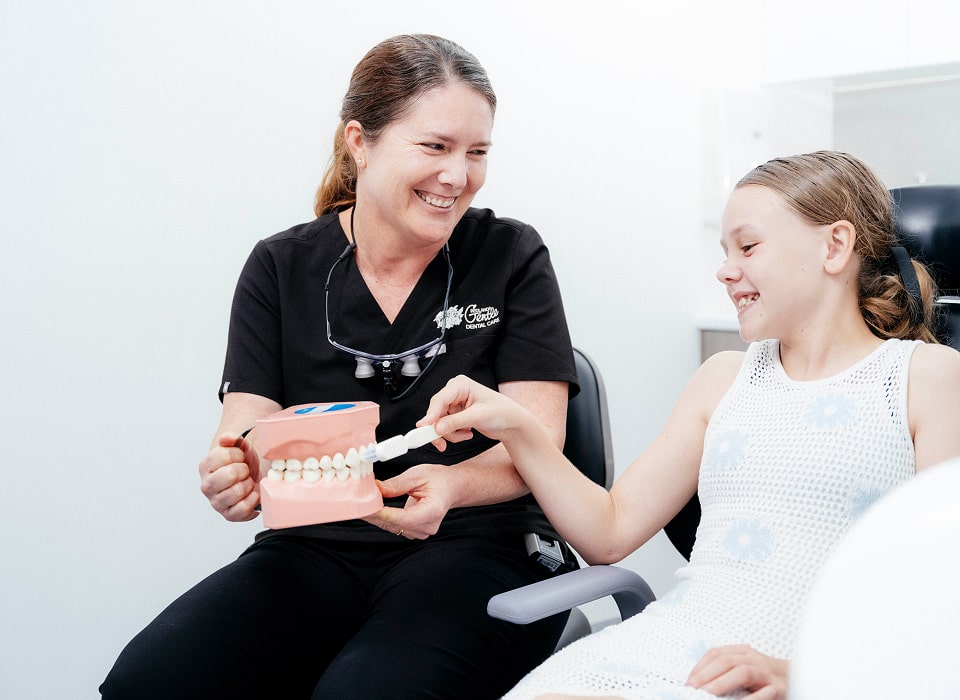Let’s Talk About You Getting Dental Veneers in Victoria Point
Why Choose Us
Why Choose Redlands Gentle Dental Care for Dental Veneers in Victoria Point
Choosing dental veneers often reflects a deeper desire for self-assurance and personal change. Here’s why people come to us when they’re ready to improve their smile in a way that still feels like them.
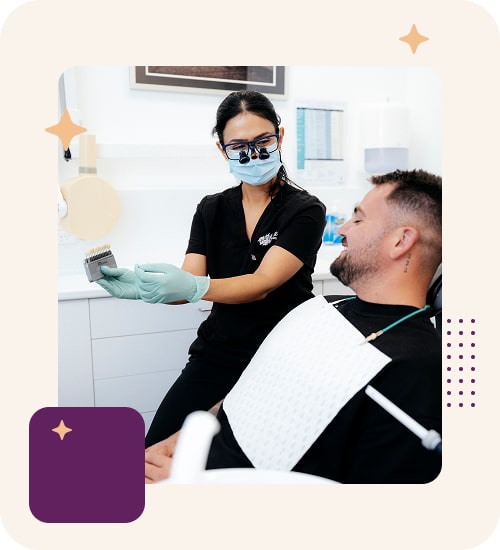
We Take Time to Listen
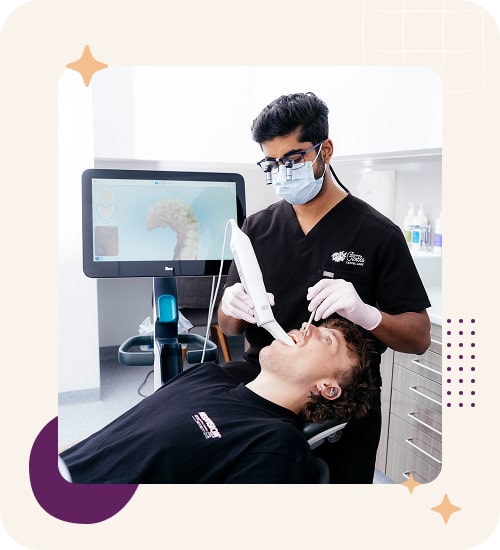
Designed to Complement You
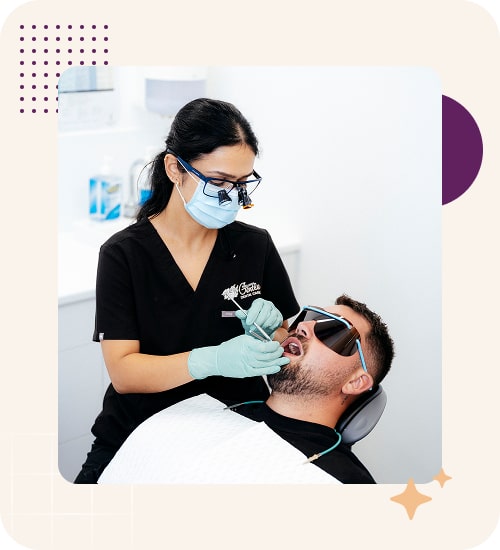
Boost Confidence Without the Guesswork
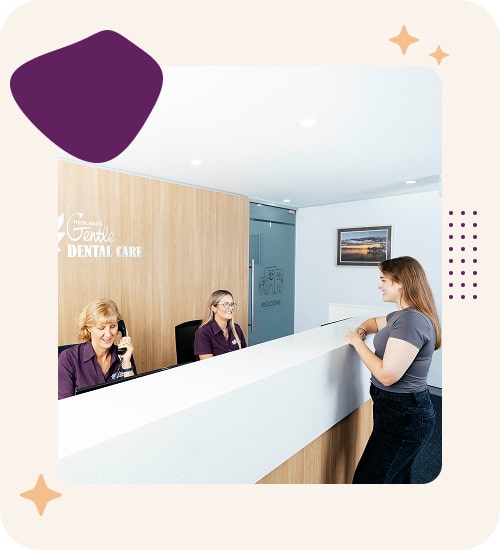
Trusted Care in Victoria Point
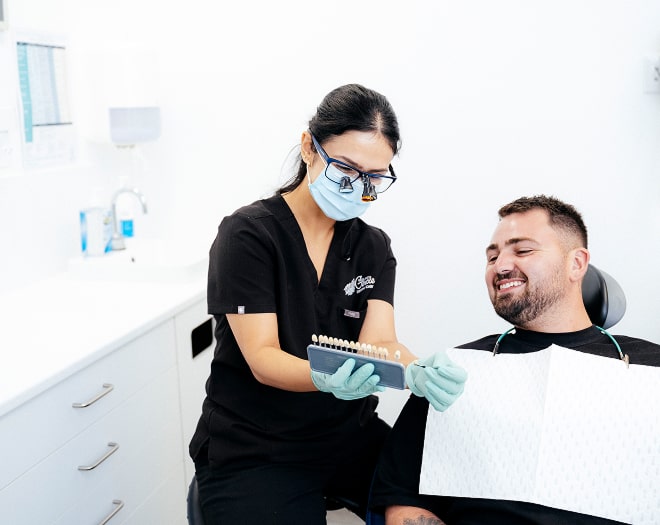
Discover How Veneers Can Improve Your Smile's Overall Appearance
Chipped, uneven, or discoloured teeth can make you feel self-conscious when smiling or speaking. This can affect how you smile, speak, or socialise. Dental veneers may improve the appearance of your teeth with natural results that last when supported by good oral care.
Two Convenient Locations
Quality Dental Services Made Accessible for Families in the Victoria Point Area
Capalaba Dental Clinic
- (07) 3245 5511
- 149 Old Cleveland Rd Capalaba, QLD, 4157
- Free Parking Available
Victoria Point Dental Clinic
- (07) 3820 7777
- 2/1 Bunker Road, Victoria Point, QLD, 4165
- Free Parking Available
Veneer Options
Understand Which Dental Veneers May Suit Your Smile Transformation
At Redlands Gentle Dental Care, we offer tailored dental veneer options to help improve the look of your smile. Whether you’re after subtle changes or a full smile transformation, we’ll guide you through the process based on your individual goals.
Discover How Porcelain Veneers Transform Your Smile
Porcelain veneers are strong, thin coverings that are made to match your natural teeth. They’re ideal for patients wanting long-lasting results with a more refined and stain-resistant option for visible front teeth.
Composite Veneers That Blend Seamlessly with Your Smile
Composite veneers are a cost-effective option made from tooth-coloured resin. Applied in a single visit, they’re suitable for minor cosmetic concerns like chips or discolouration, and can enhance your smile quickly and conservatively.

Thinking about a smile upgrade? Visit our Victoria Point clinic and book your consultation today.
How We Can Help
Explore Smile Concerns That Dental Veneers Can Address
Dental veneers can help improve the look of teeth affected by chips, gaps, wear, or discolouration. If you’re looking to change the shape, shade, or balance of your smile, veneers may be a suitable option.
Unhappy With My Smile
My Teeth Are Stained or Discoloured
I Want a Full Smile Makeover
Seeking Smile Improvement
Our Payment Options
Find What Works for Your Financial Needs With Our Dental Payment Options
Child Dental Benefits Schedule
Invest in your child's smile with the Child Dental Benefits Schedule (CDBS). This government program offers eligible families financial support for essential dental services, promoting good oral health habits from an early age.
The CDBS covers up to $1,095 over two years for basic dental care like check-ups, cleanings, and fillings for children aged zero to 17. Eligibility depends on Medicare status and specific government payments, making quality dental care more accessible to families.
Learn MoreDental Services for DVA Card Holders
Veterans deserve high-quality dental care, and the Department of Veterans' Affairs (DVA) program delivers just that. The program offers dental benefits that vary based on card type.
Gold Card holders receive comprehensive cover for clinically necessary treatments, from routine check-ups to advanced procedures. White Card holders are covered for dental care related to accepted service-related conditions or mental health needs. Our clinic proudly supports veterans by providing high-quality dental care to maintain their overall health.
Learn MoreHumm
Simplify your dental care payments with Humm, a flexible financing option that lets you smile now and pay later. This interest-free payment plan allows you to spread the cost of your dental treatments over time, making essential care more accessible.
Humm is available for various dental services, from routine check-ups to more complex procedures. With instant approval and the ability to manage your account online, Humm helps you prioritise your oral health without financial stress.
Learn MoreZip
We offer Zip to help patients manage treatment costs. With credit limits between $1,000 and $50,000, eligible patients can select flexible repayment terms from three to 60 months, making it easier to manage costs.
Zip is ideal for anyone needing dental care without upfront costs. The user-friendly app allows you to track payments easily, so you can stay on budget while prioritising your oral health.
Learn MoreSuperCare
With the help of SuperCare, eligible patients can release their superannuation funds early to access essential dental procedures. This option is suitable for families lacking sufficient health funds or available resources, covering services such as orthodontics, implants, and root canal therapies.
SuperCare's consultants guide you through the straightforward application process, simplifying what can often be complex. This service enables you to prioritise your family's oral health without the burden of upfront costs.
Learn MoreAfterPay
Experience the convenience of dental care with Afterpay, allowing you to receive treatments now and pay later in four easy instalments over six weeks. This payment option is available to anyone over 18, a practical choice for adults looking to enhance and maintain oral health.
With no interest charges when payments are made on time, Afterpay promotes responsible budgeting. Payments are automatically deducted from your linked debit or credit card for a smooth experience.
Learn MoreBupa Preferred Provider
Enjoy exclusive benefits and hassle-free claims when you choose our clinic, a Bupa Preferred Provider, for your dental health needs. Our patients can access a comprehensive range of services, including check-ups and major procedures, often at reduced out-of-pocket costs.
Members First Ultimate also offers 100% back on two dental check-ups and cleans every six months, making regular oral care more affordable. Our partnership with Bupa allows you to receive quality care while maximising your benefits.
Learn MoreHCF Preferred Provider
Experience affordable, high-quality dental care at Redlands Gentle Dental Care. As an HCF preferred provider, patients with eligible dental cover can access reduced out-of-pocket costs, no-gap services for selected treatments, and streamlined claims processing.
HCF members can take advantage of these benefits by choosing our clinic for their dental needs. Check your policy to understand covered treatments and annual limits, and let us help you achieve a healthier, brighter smile.
Learn Morenib Preferred Provider
Access professional dental care at our clinic, a trusted part of nib's First Choice network. As a nib Preferred Provider, we offer members the opportunity to receive quality dental care at agreed rates. This provides a transparent and straightforward experience for your dental needs.
Nib members benefit from reduced out-of-pocket costs and simplified claims processes at our clinic. To make the most of your cover, review your policy for applicable limits and service inclusions.
Learn MoreDental Veneer Questions Explained
Frequently Asked Questions
This FAQ section covers key topics about dental veneers. Learn what’s involved, how they’re maintained, and what to expect before and after treatment.
What types of veneers are available, and which is suitable for me?
At Redlands Gentle Dental Care, we offer two types of dental veneers. Each option is suited to different cosmetic preferences, timelines, and oral health considerations.
Porcelain veneers
Porcelain veneers are thin ceramic shells made in a dental lab and bonded to the front surfaces of your teeth. They’re often chosen for longer-term cosmetic changes or as part of a smile makeover.
Features of porcelain veneers:
- Each veneer is individually designed to match the shape and colour of your natural teeth.
- They are resistant to staining and are designed to be long-lasting with routine dental care.
- Porcelain veneers are well-suited to improving discolouration, worn edges, and uneven tooth shapes.
- A thin layer of enamel is usually removed to create space for a natural fit.
- This process usually involves multiple appointments over a few weeks.
Composite veneers
Composite veneers are applied chairside using tooth-coloured resin and shaped directly onto your teeth. They’re often chosen for more minor cosmetic changes.
Features of composite veneers:
- The resin is placed, shaped, and polished in a single visit.
- Composite veneers are a practical choice for managing chips, small gaps, or mild discolouration.
- Little to no enamel is removed during application.
- Over time, the surface may wear and require touch-ups to maintain its appearance.
- This option may suit patients looking for a quicker or more cost-sensitive treatment.
During your consultation, your dentist will discuss which option aligns with your oral health and aesthetic goals.
What is the procedure to get veneers?
Getting veneers involves several steps, each designed to provide a smooth and personalised experience. The process may differ slightly depending on whether you’re having porcelain or composite veneers.
- Initial consultation:
Your dentist will begin with an examination and a discussion about your goals. This includes exploring whether veneers are right for your needs or part of a smile makeover. - Treatment planning:
Digital scans or impressions of your teeth are taken for planning. Your dentist will talk you through the expected results and confirm how many veneers are recommended. - Tooth preparation:
For porcelain veneers, a thin layer of enamel is gently removed from the surface of your teeth to allow space for the veneers. Composite veneers may not require this step. - Veneer design and creation:
Porcelain veneers are custom-made by a dental technician, while composite veneers are sculpted directly onto your teeth during your visit. - Application and bonding:
Once the veneers are ready, they are carefully placed and bonded to your teeth. Your dentist will check that they fit well, look natural, and feel comfortable. - Review and follow-up:
A follow-up appointment may be scheduled to check bite alignment and make minor adjustments if needed.
Veneers are a popular option in cosmetic dentistry for improving the appearance of teeth. They require only minimal changes to the natural tooth structure.
How many appointments will I need for veneer treatment?
The number of appointments depends on the type of veneers you choose and your treatment plan.
Porcelain veneers
Porcelain veneers usually require two or more visits. The first visit includes an assessment, tooth preparation, and impressions or scans. A second visit is scheduled once your custom veneers are ready for placement. A follow-up appointment is scheduled to check the fit and comfort.
Composite veneers
Composite veneers are often completed in a single visit. The resin is applied, shaped, and polished directly onto your teeth during the same appointment. In some cases, a short review visit may be suggested afterwards.
Your dentist will confirm how many visits are needed based on your smile goals, oral health, and the number of veneers planned.
How many veneers can I get?
The number of veneers you may need depends on your smile goals, dental condition, and cosmetic preferences. Some people choose one veneer to enhance a single tooth, while others include multiple veneers as part of a smile makeover.
Several factors help determine how many veneers are suitable:
- The number of teeth visible when you smile:
Veneers are typically applied to the front upper teeth that show most when smiling. - The condition of your natural teeth:
Teeth with chips, uneven edges, or long-term discolouration may benefit from veneers. - Your cosmetic goals:
If you’re aiming for a full smile makeover, you may need six to ten veneers to achieve symmetry. - Your budget and treatment plan:
The number of veneers you need can influence how much the veneers cost. Your dentist will explain all pricing details clearly during your consultation. - Any additional dental needs:
Some patients may need pre-treatment procedures (such as whitening or orthodontics), which can influence how many veneers are applied.
Your dentist will guide you through these factors to recommend a veneer treatment plan tailored to your needs.
Will getting veneers change the feel of my teeth?
You might notice a slight change in how your teeth feel immediately after veneers are placed. This is common and usually settles as you get used to them.
Veneers are designed to follow the natural shape of your teeth, so they should feel comfortable once fitted. If anything feels uneven or bothersome, your dentist can adjust it during a review visit.
Will veneers affect my gum health?
When veneers are placed carefully and fit well, they should not harm your gum health. Good technique and proper alignment help the veneers sit comfortably without irritating the gum line.
Maintaining daily oral hygiene and regular dental check-ups is important. Brushing, flossing, and professional cleaning all promote healthy gums around both natural teeth and veneers.
Can you go back to normal teeth after dental veneers?
Once dental veneers are placed, you generally cannot return to your natural teeth in their original state. This is because the process involves removing a small amount of enamel from the front surface of your teeth to make room for the veneers. Since enamel does not grow back, this alteration is permanent.
Here’s what you should know:
- Veneers are a long-term commitment:
If a veneer gets damaged or worn out over time, it will need to be replaced. - Your underlying teeth will always need protection:
Because the enamel has been reduced, going without veneers or another type of restoration would leave your teeth vulnerable to sensitivity and damage. - Alternatives exist:
If you’re concerned about this, you might consider no-prep veneers (like Lumineers), which require little to no enamel removal, although they aren’t suitable for everyone.
If you’re unsure whether veneers are right for you, a consultation with a dentist can help weigh your options and discuss reversible or less invasive alternatives.
Are there any risks or side effects associated with veneers?
Veneers are widely used in cosmetic dentistry, and while they are generally well-tolerated, there are a few risks or side effects to be aware of:
- Tooth sensitivity:
After enamel is removed, you may notice temporary sensitivity to hot or cold foods. This usually settles with time and proper care. - Gum irritation:
Mild irritation around the gums can occur as your mouth adjusts to the new veneers. Regular oral hygiene helps reduce this. - Chipping or wear:
Veneers are strong, but they can chip or wear down if you grind your teeth or bite hard items like ice or pens. - Colour mismatch over time:
While porcelain veneers resist stains, surrounding natural teeth can still discolour, leading to a slight difference in appearance. - Replacement in the future:
Veneers are long-lasting, but they may need to be replaced after several years, depending on the material and care.
Your dentist will talk through these risks during your consultation and help determine if veneers are suitable for your needs.
How long do dental veneers last?
The lifespan of dental veneers depends on the material used, how well they are cared for, and your habits.
Porcelain veneers
These are durable and designed to last at least 10 years. With good oral hygiene and regular check-ups, they may remain in place for 12 to 25 years.
Composite resin veneers
Composite veneers generally last between 4 and 8 years. They are well-suited to managing minor cosmetic concerns but may wear down more quickly than porcelain.
Factors that can affect how long veneers last:
- Daily care habits:
Brushing, flossing, and attending routine dental visits help maintain both veneers and the teeth underneath. - Diet and lifestyle:
Regular consumption of hard or sticky foods, or habits like nail-biting or chewing pens, can cause veneers to wear or chip sooner. - Teeth grinding or clenching:
Teeth grinding (bruxism) can shorten the lifespan of veneers. A night guard may be recommended if this is a concern. - Material choice:
Porcelain tends to be more durable and stain-resistant, while composite may need touch-ups or more frequent replacement. - Number of veneers placed:
Veneers placed as part of a smile makeover may distribute biting forces more evenly, which can support longer-lasting results.
Your dentist will recommend a veneer type suited to your goals and guide you on how to care for it over time.
Do dental veneers come off?
Dental veneers are bonded securely to the tooth surface, but in some cases, they can come loose over time. This may happen due to factors like teeth grinding, injury, or general wear, particularly with older veneers.
If a veneer does come off, it can usually be reattached or replaced. Your dentist will check the underlying tooth and recommend a suitable approach to restore the appearance and function of your smile.
Can you get cavities with veneers?
Yes, cavities can still develop in the natural tooth beneath or around a veneer. Veneers only cover the front surface of the tooth, so areas not covered remain at risk of decay.
Good oral hygiene is essential to help prevent cavities. Brushing, flossing, and regular dental check-ups help protect both your veneers and the teeth underneath. Avoiding sugary foods and drinks can also support long-term dental health.
Are dental veneers high maintenance?
Dental veneers are not considered high maintenance. They’re designed to fit into a typical oral care routine and don’t require any special daily care beyond what’s recommended for natural teeth.
When well-placed and maintained with regular check-ups, veneers can deliver long-lasting results. As part of cosmetic dentistry, they offer a low-maintenance way to enhance your smile without disrupting everyday habits.
Can you get cavities with veneers?
Yes, cavities can still develop in the natural tooth beneath or around a veneer. Veneers only cover the front surface of the tooth, so areas not covered remain at risk of decay.
Good oral hygiene is essential to help prevent cavities. Brushing, flossing, and regular dental check-ups help protect both your veneers and the teeth underneath. Avoiding sugary foods and drinks can also support long-term dental health.
Are dental veneers high maintenance?
Dental veneers are not considered high maintenance. They’re designed to fit into a typical oral care routine and don’t require any special daily care beyond what’s recommended for natural teeth.
When well-placed and maintained with regular check-ups, veneers can deliver long-lasting results. As part of cosmetic dentistry, they offer a low-maintenance way to enhance your smile without disrupting everyday habits.
How should I care for my veneers?
Caring for veneers is similar to caring for natural teeth. Regular oral hygiene routines and dental visits help maintain their appearance and protect the tooth underneath.
Here are some helpful habits:
- Brush your teeth twice a day using a soft-bristled toothbrush and non-abrasive toothpaste to keep the surfaces clean.
- Floss daily to remove plaque and food particles from around the veneers and between teeth.
- Visit your dentist regularly for check-ups and professional cleans. The veneers can also be checked for any changes or wear.
- Avoid biting into hard items such as ice, pens, or fingernails, which could damage the veneers over time.
- Consider a night guard if you grind your teeth, as this can reduce stress on both veneers and natural teeth.
- Limit heavily pigmented foods and drinks such as red wine, coffee, or soy sauce to reduce the risk of staining around the veneers.
These simple habits help maintain your veneers and long-term oral health.
Can I still drink coffee, wine, or eat certain foods with veneers?
Yes, you can enjoy most foods and drinks with veneers, though it helps to be mindful of your choices. Porcelain veneers resist staining, but surrounding natural teeth and bonding materials may still discolour over time.
Hard or sticky foods should be eaten with care. Biting into hard items like ice or nuts may damage veneers. Sticky foods can place pressure on the edges where the veneer meets the tooth.
Veneers are designed to fit into your lifestyle. With regular care and attention to diet, they can remain in good condition for many years.
How much are dental veneers?
The cost of veneers depends on several factors. These include the material used, how many veneers are needed, and whether any other procedures are part of your treatment plan.
If you’re considering dental veneers in Victoria Point, porcelain veneers generally range from $1,500 to $2,300 per tooth. Composite veneers are more budget-friendly and generally cost between $550 and $1,200 per tooth.
Here’s a general guide for porcelain veneers:
- A set of four porcelain veneers generally costs around $6,000.
- For six porcelain veneers, the cost is approximately $8,750.
- Eight porcelain veneers are priced at around $11,500, which includes a $650 smile trial and a $500 night guard.
Each case is unique, so a consultation can provide a personalised quote tailored to your goals and dental health. Redlands Gentle Dental Care also offers flexible payment options to help manage your veneers’ cost with less financial stress.
